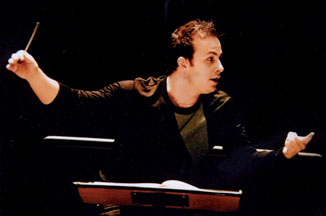Rediscovering Berlioz the great romantic
by Gwen Herat at the Royal Festival Hall
In the sound world of music texture, our imagination conjures and
recalls all those great composers that we hold in adoration. We all have
our favourites and it is not easy a task to separate one from another
because they are all great, superb and magnificent in their individual
repertoire. Their creative endeavour no matter to what country or time
they belong, play a very important part in their daily lives. I have
always been a voracious reader about musical matters and though not a
great pianist, I strived hard to keep all what I learnt, very close to
my heart because of which I am sent flying to the Royal Festival Hall
when the London Philharmonic Orchestra is at its peak. Scores I learnt
and the ones I did not care to learn, I rediscover with fascination.
This time as I took my seat at the Royal Festival Hall, it was that
great Romantic, Berlioz who crossed the stage under the baton of Yannick
Nezet-Seguin, one of the specialist conductors of the London
Philharmonic Orchestra.
 |
|
Yannick Nezet-Seguin conducting the
London Philharmonic Orchestra, bringing alive Hector
Berlioz. |
Yannick's ever-roaming eyes swept past every instrument that stood
for the performance of Berlioz. A great pianist himself, Yannick was a
perfectionist and he had such control over sound that even if one of his
instrumentalists as much as breathed hard, it fell on his ears. Every
moment of his baton yielding was a celebration and of boldness and
reasoning. He possessed a powerful intellect on what he was doing and
provided the rare opportunity to listen especially to Symphonie
Fantastique.
Yannick displayed an immaculate dexterity, grace and musicality. The
clarity and momentum this score demanded was with what Yannick directed.
There was fresh insight to Berlioz and a sense of throughout-charm I
discovered though this composer was not in my list of favourites.
Yannick's creative genius beckoned me to Berlioz. Yannick who enjoys a
world-reputation for his musical integrity, still has a long way to go
before he is able to stand in line with LPO's principal conductor,
Vladimir Jurowski.
The programme culminated with Berlioz's Symphonie Fantastique and it
was really fantastic. In Yannick's repertoire were other scores like La
Morte De Cleopatre and Overtures. It is not every conductor who takes on
Berlioz and I do not know why it is so. There was something also that I
discovered about Berlioz. As a performance of Shakespeare's Hamlet
unfurled before a Paris audience in 1827, one theatre goer got more than
he bargained for.
He not only 'glimpsed the whole heaven of art' on hearing
Shakespeare's text, but fell madly in love with Harriet Smithson, a
young Irish actress playing Ophelia. That audience member was a young
composer, Hector Berlioz. Artistic possibility, passionate love and
unerring striving fused in him.
He became the great Romantic he is known as today and set about
thrusting all his feelings into a yearning, heartfelt symphony, The
Symphonie Fantastique.
Thus, Berlioz's untouchable, captivating musical language was born.
Berlioz knew no English and Smithson knew no French and his attempt to
contact her met with no success. He sent love letters to her.
At the beginning, they startled and terrified her. He put on a
concert of his works to impress her and he rented rooms near all of
which was of no avail. Disappointed and dejected, Berlioz transferred
his love to a young pianist. Camille Moke who became a kind of surrogate
Smithson.
This inspirational story may have influenced Yannick to opt for the
works of Berlioz at the LPO. He may also have known that this
arch-Romantic was a turbulent, ecstatic, melancholic by turn and
eccentric, excessive and egotistic. He was not proficient on any
instrument except a touch and go-type pianist. His works apart from what
Yannick orchestrated some of which were:
Symphonie Fantastique
This five-movement symphony was Berlioz's first major work and
remains his most popular - Vivid imagination has poisoned himself with
opium in a fit of love-sick despair. The extraordinary visions he has
form the programme of the symphony - Artist's Reveries, the Ball Scenes
in the Country, the March to the Scaffold and The Dream of the Witches'
Sabbath.
It attracted its fair share of opprobrium; Schumann wrote 'I believe
that Berlioz, when a young student of medicine never dissected the head
of a handsome murderer with great unwillingness than I feel analyzing
his First Movement: Rossini commented succinctly 'What a dedicated thing
it isn't music. The score was later dedicated, somewhat bizarrly to the
reactionary.
Tsar of Russia perhaps because Berlioz was welcomed to Russia in
1847. Harold En Italie Opp 16 (1834) a successor to the Symphonie
Fantastique, the subtitle of the work is Symphony in G for viola and
orchestra explains why Paganini was less than enthusiastic at the work
he had commissioned.
Berlioz was impressed by the Impressions Recollected from wandering
in the Abruzzi mountains. The viola part is a kind of melancholy dreamer
in the style of Byron's Childe Harold.
Romeo et Juliette.
Op. 17 (1839) Dramatic symphony for soloists, chorus and orchestra,
is based on Shakespeare's play and is most usually encountered through
orchestral excerpts such as the Love Music theme and the gossamer-like
Queen Mab scherzo.
|

